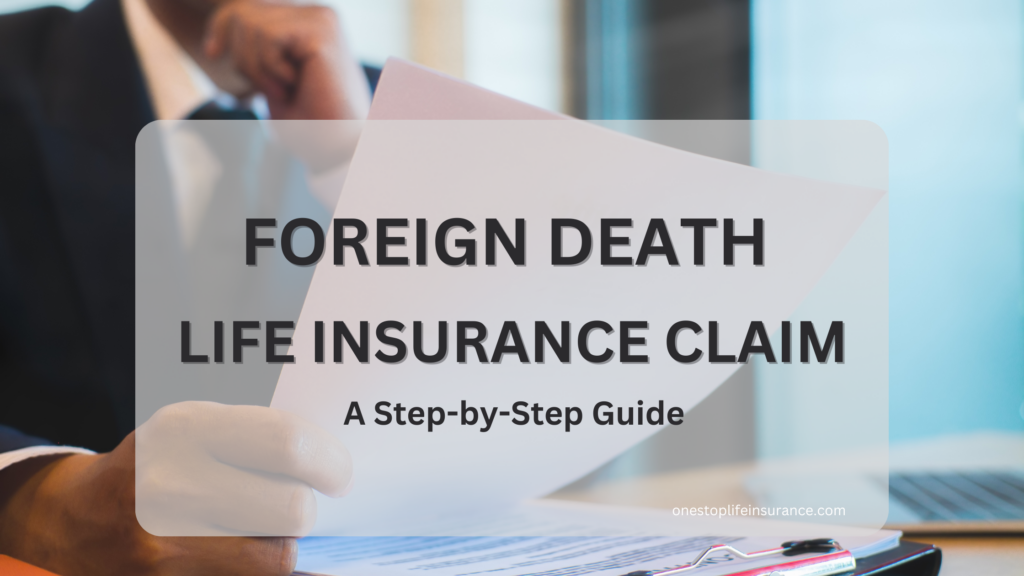Foreign Death Life Insurance Claim: A Step-by-Step Guide
For beneficiaries, the loss of a loved one is already a deeply challenging time, and dealing with additional complexities can add to the stress. This guide will answer two common questions: How do I claim life insurance benefits if an insured person dies abroad? and Will foreign deaths be covered by life insurance? We’ll outline the detailed steps involved in filing a foreign death life insurance claim for someone who passes away outside the U.S. We’ll also provide examples of what insurance companies may ask and helpful advice for handling foreign-related claim requirements.
Will My Life Insurance Payout If I Die Overseas? Foreign death life insurance claim
The short answer is yes; most life insurance policies cover you worldwide. However, there are important aspects to consider when filing a foreign death life insurance claim:
Disclosure of Travel Plans: When applying for a life insurance policy, insurers often ask about any planned travel within the next two years. They may ask you to specify details about the location, length of stay, and purpose of your trip. For instance, travel to countries under active travel advisories or regions with higher health risks may impact your policy application or the level of coverage. Make sure you disclose all travel plans. Failing to do so may result in the denial of a potential claim. We’ve covered in detail will my life insurance policy payout if I die abroad.
Steps for Filing a Foreign Death Life Insurance Claim
In the unfortunate event that a policyholder dies while abroad, life insurance companies usually follow these steps to process the foreign death life insurance claim. Here’s what to expect:

- Obtain Essential Documentation
- Death Certificate: A certified copy of the death certificate from the country of death is required. Some countries’ documents may need to be translated into English and authenticated. This translation should ideally be done by a certified professional or licensed provider as specified by the insurance company.
- Consular Report of Death Abroad (CRODA): If the deceased was a U.S. citizen, a CRODA can be obtained by contacting the U.S. Embassy or consulate in the country of death. This official document helps to verify the death and may simplify the claims process. For foreign nationals, this step will be skipped.
- A Foreign Death Investigation: This is a routine step to verify the insured’s passing and the circumstances surrounding it. Life insurance companies may either conduct this investigation internally or hire a third party. Insurers are looking to confirm:
- The authenticity of the death certificate.
- The exact cause of death and manner of death.
- That the claim falls within the policy’s terms and conditions.
- Completing the Foreign Death Questionnaire: To expedite the foreign death life insurance claim process, beneficiaries may need to complete a Foreign Death Questionnaire. This form varies slightly among companies and is designed to gather key information about the deceased and their circumstances. Below we will outline some of the most common questions that companies will ask when processing a death claim.
Completing the Foreign Death Questionnaire
To expedite the claim process, the beneficiary or claimant may need to complete a Foreign Death Questionnaire, a form designed to gather key information about the deceased and the circumstances of their passing. Here’s an overview of what insurers typically ask:
- Personal Information of the Deceased
- Full name, address, date of birth, and Social Security number (or other national identification).
- Citizenship status and passport number (or other identifying information). If the insured was not a US citizen, they will still need a copy of the passport from his country of origin.
- Employer’s name and address, if employed.
- Any other existing life or accidental death policies.
- Travel Details
- Date of departure from the U.S. and intended length of the trip.
- Purpose of the trip (work, vacation, relocation, etc.).
- A copy of the travel itinerary, if available.
- Travel companions.
- Weather a travel agency was used (name and contact information).
- Flight and transportation details.
- Medical and Health History
- Any significant medical conditions, illnesses, or recent treatments.
- Medications the deceased was prescribed, including dosage and purpose.
- Overall health status before leaving the U.S.
- Details of Death
- Exact location of the death (address, city, and country).
- Cause and manner of death (e.g., natural, accidental, homicide, or suicide).
- Information on any police report, if applicable.
- Dates and addresses of hospitals or facilities where the deceased was treated.
- Burial or Cremation Details
- Information on burial, cremation, or entombment, including the name and address of the funeral home.
- Required permits for burial or cremation.
- Funeral or memorial service details, if applicable.
- Claimant Information
- Full name and address of the person completing the form.
- Relationship to the deceased.
- Proof of identification.
- Signature of the claimant.
Reasons a Foreign Death Life Insurance Claim May Be Denied
In certain situations, life insurance claims for foreign deaths may be denied. Here are common reasons for denial:
- Non-Disclosure of Foreign Travel: If the insured didn’t disclose plans to travel abroad or activities like high-risk sports, the claim may be rejected.
- Policy Lapse: If the policy wasn’t active at the time of death due to non-payment or cancellation, the insurance company is not required to pay the claim.
- Insufficient Proof of Death: In some countries, record-keeping may differ from U.S. standards, making it difficult for insurers to verify death.
- Suicide Clause: Most life insurance policies exclude coverage for suicide within the first two years. If this occurs within that period, insurers may deny the claim.
For further details, consider reading this guide from Attorney Tatiana Kadetskaya, which provides insights on handling foreign death claims.
FAQs: Foreign Death and Life Insurance Claims
1. Do I need a translated death certificate?
Yes, if the death certificate is issued in a language other than English, you must provide a certified English translation for the insurer.
2. What is a Consular Report of Death Abroad (CRODA)?
The CRODA is an official U.S. government document confirming a citizen’s death abroad, often required for legal and insurance processes.
3. Will the policy cover all foreign countries?
Most policies cover global locations, but you should confirm with your insurer, as some restrict coverage in high-risk regions.
4. How long does it take to process a claim for a foreign death?
Processing times vary but generally range from several weeks to a few months, depending on the complexity of the claim and documentation availability.
5. Can the claim be denied if travel plans weren’t disclosed?
Yes, nondisclosure of foreign travel plans, especially to high-risk areas, can result in claim denial if it constitutes a policy violation.
6. Is an autopsy required if someone dies abroad?
Autopsies may be required depending on the cause and location of death, and some insurers may request one if there are questions surrounding the death.
Helpful Resources When Someone Passes Away Abroad
Contact the U.S. Embassy or Consulate
For U.S. citizens, contacting the local U.S. Embassy or Consulate is crucial. They can assist with obtaining the Consular Report of Death Abroad (CRODA), handling the deceased’s personal effects, and coordinating the return of remains if needed.
- CDC’s Guide for Reporting a Death Abroad: For comprehensive information on procedures, visit the CDC’s website for guidance on handling a death abroad.
Legal and Financial Considerations
In some cases, local laws may impact the deceased’s estate, particularly if there were unresolved medical expenses or civil liabilities due to accidents. Consulting a legal advisor can provide clarity on any obligations in the foreign country.
Conclusion: Secure Your Life Insurance Benefits with Proper Planning
Passing away abroad introduces complexities to the foreign death life insurance claim process, but understanding the required steps and documentation can ease the journey for loved ones. By gathering essential documents, completing the necessary forms, and consulting with the U.S. Embassy or legal advisors, beneficiaries can secure the financial benefits that life insurance policies promise.
If you have questions or need guidance with your policy or coverage rates, please feel free to reach out to our team for support. Life insurance offers invaluable protection, and we’re here to ensure that your family receives its full benefits, regardless of where life’s journey takes you.
